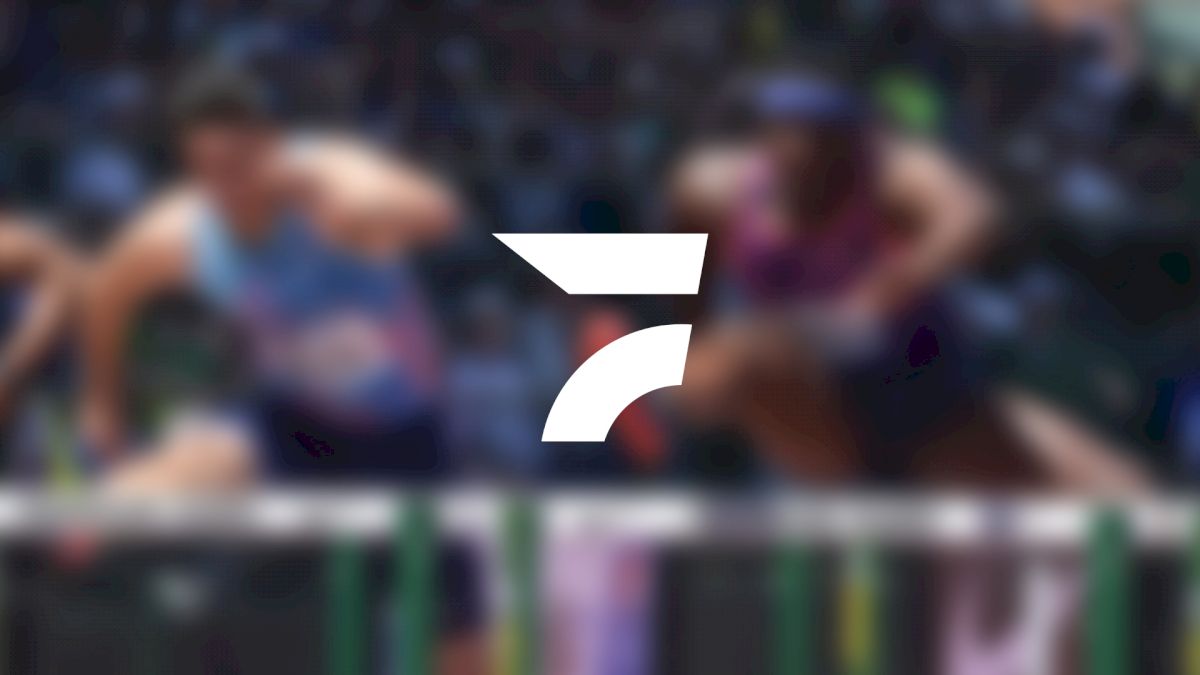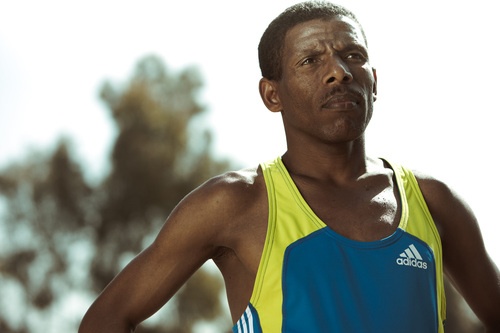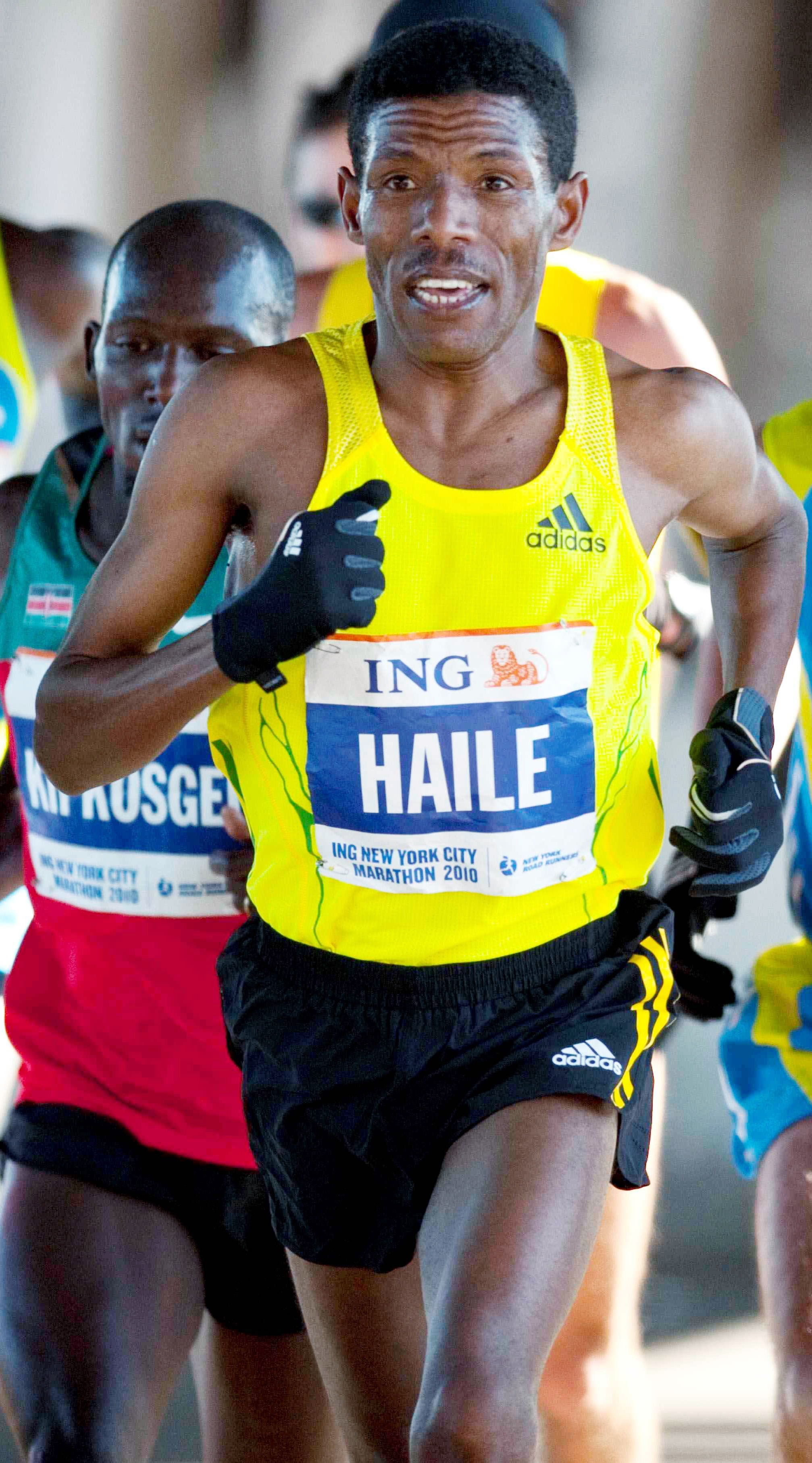New York City MarathonOct 29, 2015 by Joe Battaglia
Haile Gebrselassie Enters NYC Marathon Hall Of Fame, Regrets Never Winning Race
Haile Gebrselassie Enters NYC Marathon Hall Of Fame, Regrets Never Winning Race

NEW YORK – Five years ago, Ethiopian great Haile Gebrselassie came here looking to add the one thing missing on his illustrious distance-running resume – a victory in the New York City Marathon.
Instead, he walked off the course 25 kilometers in with an inflamed knee, walked into the post-race press conference emotionally and spiritually broken, and walked away from the sport, announcing a premature retirement.
Gebrselassie, 42, recently announced that he would no longer run competitively, bringing to a close arguably the greatest distance running career of all time, one which included 27 world records – three in the marathon – two Olympic gold medals and eight world championships.
On Thursday, he returned to New York to accept the Abebe Bikila Award and induction into the TCS New York City Marathon Hall of Fame. After the ceremony, he sat down with FloTrack and in a poignant interview discussed his life after competition and the biggest regret of his running career.
What is life like now for you after competitive running? Is it much different?
It is. It is. When you come here, you always come with your shorts and singlet prepared for the race. At the moment, when you see me in a suit, it’s a different Haile Gebrselassie. I miss my tracksuit. That is what I am comfortable in. After a while, a tracksuit is like inside your body.
We’ve always talked about this time coming and you always said that it would never be a complete retirement and that you would always continue running. How much do you still run and has the training cut back a lot?

I am still training, sometimes, two hours. Most times I will run for two hours, and if I don’t have something to do in the afternoon, sometimes I will run twice. But the morning session is always there. I get up at 5:30 and run for one hour, one and a half hours in the forest, because I live very close to the forest. I’m still fine. I’m okay, no fat. The only thing I miss, you know, is competition.
When I talk about competition, I want to run this coming Sunday. If I jumped in this race, everyone would expect me to be in the leading group. I cannot do that, but I want to finish this marathon. After two years, I will come back to at least finish the race, no matter what. Maybe it will take three hours. Maybe it will take two and a half. I don’t care. I want to finish this race in the next two or three years.
Being back here in New York this week, how much does it have you thinking about not being able to finish the race a few years ago and announcing your retirement prematurely? Does all of that emotion come flooding back?
Sometimes when you remember 2010 it’s painful, I’m telling you. What can I do? Sometimes, even after five years, the pain is still there. One thing, why I am still remembering that one, is because of my preparation. I was very sure I was going to win the race. All of a sudden, that thing happened. Everything was destroyed. All of the preparation was gone. That’s why (the pain) comes again and again. What can you do? One of my plans was always to win the New York City Marathon. I think one of the reasons I could not finish that race I was too ambitious… you know what I am saying. What can I do?
When you look back on your career: 27 world records, three in the marathon; you’ve won everything that there is to win; is your one regret that you were not able to put together a really-good performance in New York?
I think one of my regrets, believe it or not, is to not win the New York City Marathon. Some people were asking me if I regret not winning at the Beijing Olympics. I don’t. I wish I had won the New York City Marathon.
I think I could have had a chance. I think if I would have started the marathon early, like in 2002 or 2003, I think it would have been a possibility to win in New York. The problem for staying long on the track, after that (time) was too short to win many marathons around the world, including the New York City Marathon, especially.

I am okay now. I’m 42. If I kept competing, I might have been injured very quickly by training seriously. That is why I decided to stop competing. It’s the reason I am not competing anymore. Of course, I am still running.
What, ultimately, do you want to do to keep connected to running? Besides running yourself, would you like to manage runners, or to coach runners, or to organize races?
I want to do something. To coach might be difficult because at the moment I am doing a lot with my business. Because of that, being a coach would not be easy for me. Instead of that, I would like to do something for athletics. I can do media. I can encourage youngsters by going to their training camp, especially in Ethiopia where I am doing a lot. Once a week, I go to a training group to talk to their coach, to encourage them, to advise them. At the same time, I like to give types of advice to the Ethiopian athletics federation, to the sports commission, whatever.
Those are the types of things I am doing right now. Besides that, the thing that I have to do is attend to my business. My business is quite big now. Over 1700 people work in the company. It’s not easy. I am here a week and every day I have to call and see what is happening, so forth and so on. When you talk about business, it’s not something that you put your money (in) and then you watch. When you do a business, you put your money and you put yourself as well. That is what I am doing now.
How is family life? Do your wife and kids like it that you are not traveling around the world competing anymore?
I am good. My wife is here with me today in New York. The kids are good. Sometimes I go with the kids somewhere. I don’t do so much vacation because, as I told you, all of the things I do. I don’t know. Maybe I did something hard on myself in starting this business. Maybe it was a mistake when it comes to my personal life because I share all of the things that I have in the business. It’s not only my money but also myself. To share your money is one thing but to share yourself means my daily life, my private life, I gave it up for others. Maybe that is a bit too much. But what can I do? I started this already. I cannot come back. I have to keep going.
But with training cut back and you no longer competing, do you find that you have more time to spend with your family or has that time been swallowed up by the business?
One thing I want to tell you: I am still trying to balance. Maybe not so much balance, but to give some more time for my family. Every morning I am trying to bring them to school. Before I bring them to school, I have to finish my training, but I start my training at 5:30 and my training is very close to my house. As soon as I finish, I have time to bring them to school and to talk.
Then it is to the office. I start by 8 in the morning until 5 in the evening. Then, I start my second session in the evening, doing gym training. I am home, back at the house, before 7 and spend time before they go sleeping.
This kind of daily life is fine. Besides this, if I have time, we do some other things. My son is very crazy about football. I try to play a bit with him, but I am not a footballer guy. I wish he would become a runner, but what can you say? I give him morale and things like that. One of my daughters wants to be a lawyer and she asks me a lot of questions and I have to answer the questions with what I know.
So, you have stopped competing but life has not slowed down?
I think the pace is more faster. Even after competing, I am going fast.
It used to be two to three hours of training in the morning and then take sleep the whole day and then do another training session in the afternoon. It used to be like that. Now, life is something very different.